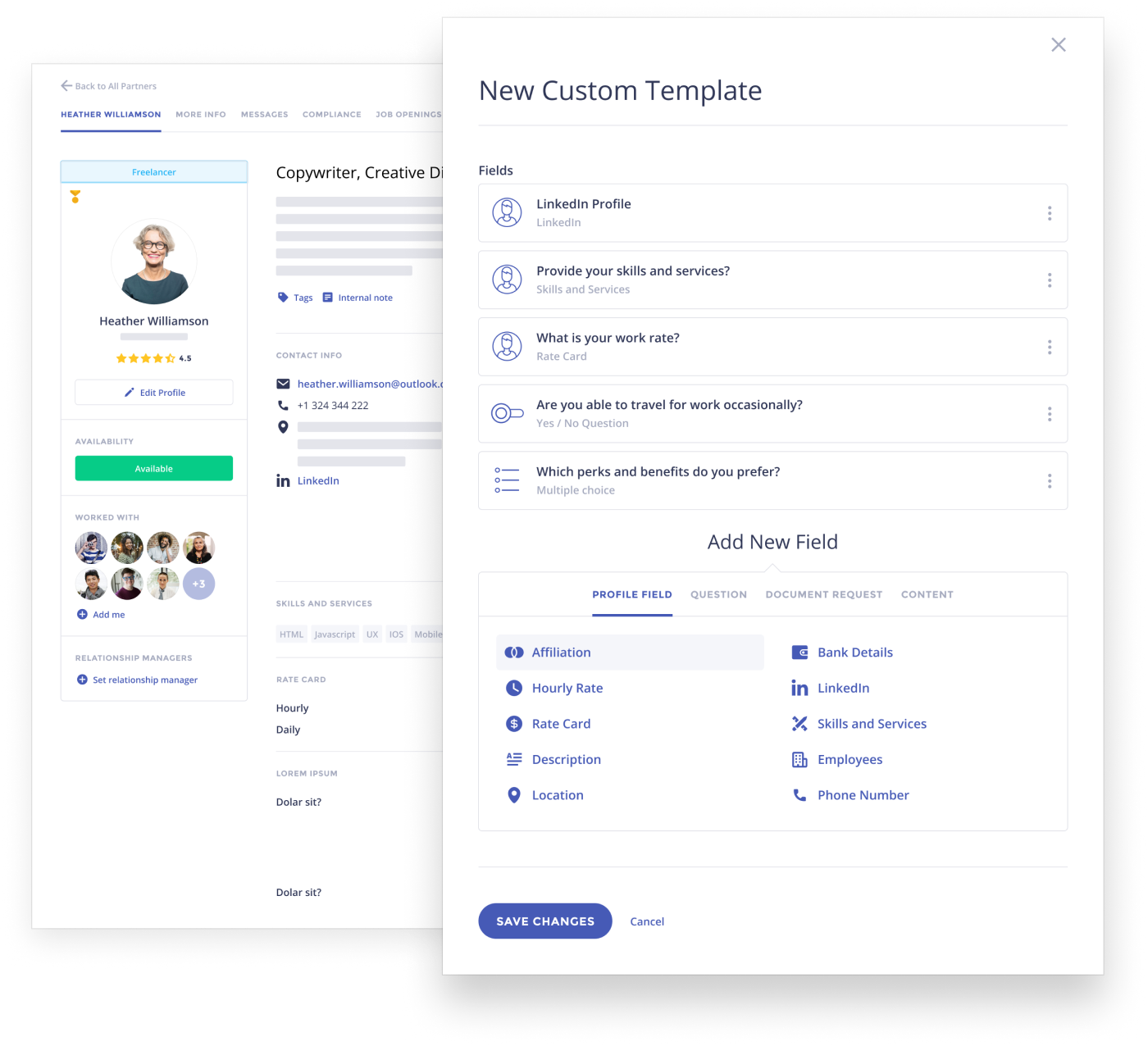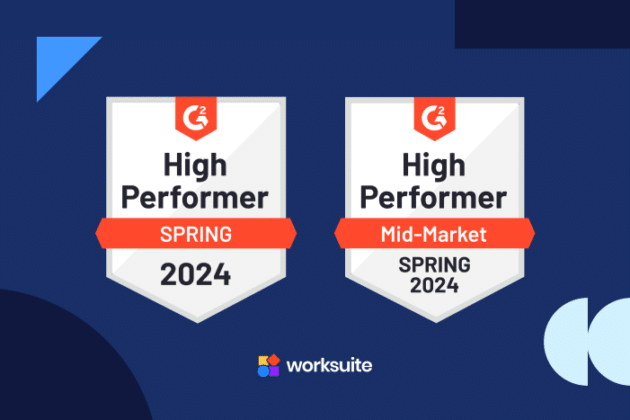
7 Best Contractor Management Software For Global Enterprise Companies


Working with freelancers gives you access to experts in every corner of the world to help you get things done faster and cost-effectively. Contractor management software ensures you manage your freelance contingent workforce without losing your mind in the process.
If you’ve been working with a team of freelancers for a while, you may feel that spreadsheets are not cutting in anymore. Neither is emailing back and forth with tens (or hundreds?) of freelancers. And yet, that’s how most managers start.
But as your pool of freelancers grows bigger, things can easily get out of control (if they haven’t already!). Managing multiple freelancers without the right systems in place is time-consuming and extremely risky:
- Admin work can consume precious hours that you and your team could use to focus on more strategic tasks.
- Misclassifying a worker or breaking local employment laws can lead to expensive fines.
- Delayed (or lost) payments can hurt your reputation and deter talented freelancers to continue working with you.
Contractor management tools allow you to centralize previously scattered information in one place, and make it simple for you to onboard, manage, and pay freelancers.
Your team and your contractors win when you choose the right tool
Your HR, Finance, and Compliance teams:
- Save hours from manual work
- Can track spend and understand project profitability
- Make sure all contractors are compliant with local laws
While your contractors:
- Enjoy a smooth onboarding process
- Get paid on time
- Become part of your trusted network for the long-term
Finding the right contractor management software can be tricky. While some tools focus exclusively on managing contractors, other apps are built to help you hire remote, full-time employees. And while all-in-one tools cover the entire contractor management process — from onboarding freelancers to handling payments — more specialized apps tackle specific problems, such as compliance.
How do you pick the best-fit tool for your company, with so many options out there?
To save you time, we’ve spent 10 hours researching the top contractor management tools in the market and narrowed them down to 7. But before jumping into the list, here are the key aspects you should consider when analyzing tools:
- Geography and currency coverage: Can you use the tool to hire freelancers worldwide? Do they have geographic limitations? How many currencies do they support to pay your freelancers? This can be a decisive factor when working with global freelancers.
- Listings: Are you managing your own private list of freelancers or sourcing them from a public marketplace? Some tools in this list have been acquired by talent marketplaces (eg: Fiverr acquired Stoke Talent). While they can provide access to new freelancers, the associated costs are paying higher fees and losing exclusivity with your contractors.
- Payments: Do they have a built-in way to process payments? With an integrated payment solution you can automate payments on a reliable, secure, unified platform, and reach out customer support if anything goes wrong.
- Compliance / Worker classification: Do they handle compliance and help you properly classify freelance workers? Do they cover compliance for any country in the world? Do they offer contract management? Checking this can prevent future headaches when you’re trying to source talent from countries you’ve never worked with before.
- Coverage for fines and legal fees: Do they offer this service as part of their paid plans? Extra coverage creates an additional layer of protection in case anything goes wrong with your contractors’ compliance.
- Free trial: Can you try the tool and explore its key features to see if it’s a right fit for your business? Will they push you to a free demo or sales call?
- Pricing model: Are prices based on seats, monthly spend, or other models? Knowing this can help you estimate how much you would have to pay on a monthly basis.
Finally, we simulated how much you’d pay for 100 contractors, with a $100K monthly spend, to help you estimate your budget for the right contractor management software.
Here are the 7 best contractor management software:
Let’s dive right in!
1. Worksuite – End-to-end tool for enterprises with a large freelance base

Worksuite is an end-to-end contractor management tool for global enterprises. You can use Worksuite to onboard, manage, and pay freelancers in all countries, on their currency of choice.
Unlike other tools in this list, Worksuite is not a marketplace. Actually, it’s the opposite.
Instead of publicly sharing your best talent with other companies, Worksuite helps you grow a curated, private network of contractors. Rather than jumping from one talent profile to the next one, Worksuite puts more emphasis on managing long-term relationships with your outsourced workforce.
Worksuite is particularly suitable for large companies scaling up from dozens, to hundreds and even thousands of freelancers (think brands like Netflix, Vox Media, or Disney). Enterprises want tools to adapt to the way they work — not the other way around. Worksuite fits the bill by enabling you to fine-tune every detail based on your company’s specific processes. This includes setting up custom onboarding workflows and organizing freelancers based on your own criteria.
When it comes to pricing, Worksuite offers plans that don’t punish you as you grow. While other tools charge you for each contractor you work with, Worksuite lets you manage unlimited freelancers at a fixed rate.
Using their payment platform is optional. But if you do decide to use it, you can process payments with a fee as low as $5 per invoice + 1% on your spend — the lowest fees of all products reviewed in this article.
Worksuite at a glance
- Location and currency coverage: Worksuite is available in 190 countries and processes payments in 120 currencies.
- Freelancers sourcing: Create your own private contractor network and instantly find the right talent for your projects. Your talent pool is private and not shared with anyone else.
- Payment platform: Worksuite Global Pay lets you approve, schedule, and pay freelancers in bulk. Using the payment solution is optional.
- Payment fees: $5 per invoice + 1% on your spend.
- Compliance / worker classification: Worksuite automatically verifies IDs and documents, creates contracts tailored to local laws, and classifies contractors so you can safely engage them directly. Where regulations or risk make direct engagement untenable, then Worksuite compliantly hires the talent on your behalf as the AOR (agent of record) or EOR (employer of record).
- Coverage for fines and legal fees: A warranty of up to $25,000 covers you from any fines or penalties due to misclassification.
- Free trial: 14-day free trial available.
- Pricing model: Pricing starts at a fixed monthly rate to manage unlimited contractors, based on key features and user seats (Freelancer Management System) plus a fee per invoice (if you use the Global Payment solution).
Payment fees estimate
This would be your Worksuite pricing, if you were managing 100 contractors and spending $100K/month:

2. Worksome – For agencies sourcing talent mostly in UK and US
Worksome is a contractor management platform and a talent marketplace. They mostly serve agencies and help them find, manage, and pay freelancers.
Worksome’s main markets are the United States and the United Kingdom. In fact, they have specific tools to classify external workers in those locations and reduce the risk of fines. Outside the US and UK, Worksome is limited to a few European countries, so you won’t be able to hire contractors from multiple countries, if you want to stay compliant.
Worksome’s primary goal is to build a marketplace of vetted freelancers that companies can hire for their projects. This brings up 2 concerns for employers:
- Platform focus: Is Worksome being built to attract and serve freelancers or are they building the right features to help businesses source and manage contractors? Worksome’s focus seems to be the former.
- Fighting for talent: As a public marketplace, any freelancer who’s listed in Worksome is going to be available for work with any other company on the platform. Are you willing to share your trusted experts with other companies — even competitors?
For agencies or brands constantly chasing new talent, having access to a marketplace can be a nice-to-have. However, Worksome charges you a higher fee for contractors you source from their platform. Their usual payment fee is 4%, but if you work with a freelancer you’ve found through Worksome, there’s an added fee of 4%, which leads to a grand total of 8% of your spend with that specific contractor.
It’s nice to have access to a public talent pool — it’s not so nice to pay extra for it.
Worksome at a glance
- Location and currency coverage: You’re limited to hire and work with contractors based on the countries where the platform is available. You can pay external workers in 150 currencies.
- Freelancers sourcing: The platform offers a public marketplace with more than 30k freelancers, sourced from countries where Worksome operates.
- Payment platform: You can process payments internationally through Worksome’s platform.
- Payment fees: 4% per payment processed and 8% per payment processed for freelancers hired through the Worksome talent network.
- Compliance / worker classification: Automatically classify workers in the US and UK with Worksome’s specific solutions.
- Coverage for fines and legal fees: No coverage offered.
- Free trial: You can sign-up for a free demo or create a free Worksome account.
- Pricing model: Worksome charges a flat fee over each processed payment, plus an additional fee if you hire a freelancer from their marketplace. There’s also a custom plan for large enterprises.
Payment fees estimate
This would be your Worksome pricing, if you were managing 100 contractors and spending $100K/month:

3. Deel – Good for remote hiring, not so great to work with contractors
Deel is the first company on this list that doesn’t tackle the entire contractor’s journey. No marketplace. No tools to manage your freelancers. Instead, they describe themselves as a payroll and compliance solution.
So yes, Deel can handle all the paperwork involved in hiring workers abroad compliantly — but that’s as far as it goes. If you want to find the perfect talent for each project within your network, know who’s available to work, assign tasks, track project budgets, and evaluate contractor performance… you’ll need to pay for other tools.
Deel’s main focus is on hiring employees, not contractors. With entities in more than 80 countries, Deel attracts startups and enterprises that want to hire offshore, in-house employees. Even though you can onboard contractors, you might feel pushed to hire them as full-time employees — after all, that’s how Deel really makes money with.
Deel also has a payroll solution that lets you centralize payments for your entire team, whether they’re employees or contractors. Deel gives you access to payroll data, so you can keep track of your spend across all countries.
Deel at a glance
- Location and currency coverage: Hire employees or contractors in 150 countries, and process payments in 90 countries and 120 currencies.
- Freelancers sourcing: Deel is not associated with any public marketplace and you can’t build a searchable contractor list.
- Payment platform: You can pay employees and contractors through a global payroll solution, considering taxes, deductions, and benefits.
- Payment fees: Deel doesn’t charge payment fees. Instead, they offer 3 different plans at $49, $99 and $599 per contract, per month.
- Compliance / worker classification: To hire contractors, Deel offers 3 plans with different compliance levels. The most basic plan ensures contractor compliance with local laws, while on the highest plan Deel classifies contract workers and hires them on your behalf.
- Coverage for fines and legal fees: Deel premium’s plan covers up to $25,000 in legal costs due to misclassification. On its highest plan, Deel assumes total liability in case there’s any classification issues.
- Free trial: No free trial available, but you can request a 30-minute demo.
- Pricing model: You pay a monthly fee per contract. You can hire contractors at $49 or $99 per contract per month. Even more if you choose Deel’s highest protection plan. To hire employees, you pay from $599. Costs can vary widely depending on the countries you hire from.
Payment fees estimate
Deel doesn’t charge payment fees. This would be your Deel pricing, if you were managing 100 contractors, regardless of your monthly spend:

4. Stoke Talent – Work with freelancers on short-term projects
Stoke Talent is a freelance management system that helps businesses find, onboard, manage, and pay independent contractors.
Stoke Talent was acquired by Fiverr, a freelance marketplace, in 2021. This means you can find and hire new freelancers for your projects via Fiverr. It also means you’re sharing your best contractors with other companies, limiting their availability to work on your projects and creating a bidding war for talent.
Stoke Talent is about quickly finding freelancers to fill gaps in your workforce. You hire them, pay them, and move forward. This may be useful if you work with freelancers occasionally, but not if your company relies on a stable, committed team of freelancers on a consistent basis. If you want to nurture a private network of freelancers and make them feel valued, Stoke Talent might not be a right fit for you.
Stoke Talent at a glance
- Location and currency coverage: Pay freelancers in 190 countries and 80 currencies.
- Freelancers sourcing: Stoke Talent is a Fiverr product. You share access to Fiverr freelancers with any company in the world.
- Payment platform: Stoke Talent acts as an intermediary. They pay all of your freelancers and contractors while you get a single monthly invoice, in your currency of choice.
- Payment fees: Stoke Talent Core: 3% fee based on monthly payments. Stoke Talent Premium: 5% fee based on monthly payments. Sourcing talent: 10% of total payments on talents sourced through Stoke Talent.
- Compliance / worker classification: Sign legal docs, follow tax compliance, and classify contract workers using AI.
- Coverage for fines and legal fees: No coverage offered.
- Free trial: 30-day free trial available.
- Pricing model: Pricing is based on monthly spend. There’s a plan for small teams (3% fee) and a plan for larger teams that include background checks and other compliance features (5% fee). In both cases, fees can quickly add up to 10% if you source freelancers through Stoke Talent.
Payment fees estimate
This would be your Stoke Talent pricing, if you were managing 100 contractors and spending $100K/month:

5. TalentDesk – For small businesses with less than 100 freelancers
TalentDesk is an all-in-one management system for freelancers and hiring organizations. PeoplePerHour — UK’s leading talent marketplace — is behind TalentDesk. Both platforms are integrated, so it only takes a few clicks to source freelancers and invite them to your TalentDesk directory.
At first glance, TalentDesk may seem too similar to other end-to-end platforms on this list. You can create custom onboarding templates, do project management, and automatically pay freelancers. But TalentDesk is better suited for handling small-scale operations.
According to their website, most businesses using TalentDesk are start-ups and small/mid-sized companies with teams ranging from 20 to 150 freelancers.
TalentDesk fits businesses that need to scale fast — whether that means hiring freelancers or full-time employees. However, TalentDesk can’t easily meet the needs of large enterprises, which are already working with hundreds and sometimes thousands of contractors. These organizations require solutions that can be fully customized — which you can’t accomplish with TalentDesk.
Finally, bigger enterprises working with lots of contractors tend to prefer pricing models that don’t penalize growth. TalentDesk charges $49 per contractor per month as an Agent of Record or a starting price of $399 per employee per month as an Employer of Record.
TalentDesk at a glance
- Location and currency coverage: Pay freelancers in 150 countries and 55 currencies.
- Freelancers sourcing: TalentDesk is integrated with PeoplePerHour and gives you access to the top 3,000 profiles on the platform, which means other businesses will be sourcing talent from the same pool. You can add freelancers to a searchable directory and also invite your own contractors.
- Payment platform: Process payments by paying a transaction fee based on your spending and currencies. TalentDesk sends you one consolidated invoice so you can pay all your contractors at once.
- Payment fees: Undisclosed payment fee.
- Compliance / worker classification: You can hire contractors through your own legal entities or use TalentDesk as your Agent of Record (AOR), which means they take care of compliance checks and worker classification.
- Coverage for fines and legal fees: No coverage offered.
- Free trial: 15-day free trial available. You can also request a demo.
- Pricing model: A fixed $399/month rate for using the Freelancer Management System only (includes 5 seats and you can add more at an extra cost). You’ll have to pay a fixed price per contract if you also want to use TalentDesk as an Agent of Record ($49/mo per contract) or Employer of Record ($399/mo per contract).
Payment fees estimate
This would be your TalentDesk pricing, if you were managing 100 contractors and spending $100K/month.

6. WorkMarket – Find and manage freelancers, mainly in the US
WorkMarket is a freelance management system and a popular freelance marketplace backed by ADP (Automatic Data Processing).
WorkMarket targets companies that want to scale quickly and helps them find the right talent. But they don’t stop there. WorkMarket also handles onboarding, verification, contractor management and payments.
Unlike other tools, WorkMarket is mainly focused in the US. Most freelancers on their marketplace are from the US and compliance features are specifically adapted to US regulations. This can be a huge drawback for businesses looking to attract contractors or freelancers at a global scale.
WorkMarket has its own mobile app where freelancers can set up their profiles and pay for background checks so they can access jobs. WorkMarket is heavily oriented towards the IT sector, so most of the freelancers in the app are tech professionals.
Companies can source freelancers through the platform and onboard them using custom verification workflows, to ensure everyone meets specific contractor compliance requirements.
Then, companies can add pre-vetted freelancers to “labor clouds”, based on categories like contractor type or skill level. Labor clouds make it easy to communicate and assign tasks to an entire group of freelancers at the same time.
While WorkMarket has useful features, customers report the platform and mobile app look outdated and crammed with information, making it hard for freelancers and business users to find what they need.
WorkMarket at a glance
- Locations and currency coverage: WorkMarket is mainly centered around the US, but you can also pay freelancers internationally if they use PayPal or similar payment processors.
- Freelancers sourcing: Source pre-vetted freelancers from their marketplace, and other companies can, too.
- Payment platform: WorkMarket integrates with different payment methods, including ACH/Bank Account, PayPal, Hyper wallet, and Wisely.
- Payment fees: Undisclosed payment fee.
- Compliance / worker classification: Automate ID verifications and set custom requirements to ensure compliance.
- Coverage for fines and legal fees: No coverage offered.
- Free trial: No free trial available.
- Pricing model: No pricing information available.
7. Remote – Hire employees & contractors globally, with very limited management
Remote is an employee and contractor management platform. They position themselves as leaders in global HR. Their focus is mainly on international payroll, taxes, and compliance.
They have legal entities in several countries that work as your own local HR team. Even though they have contractor management capabilities (common features include covering onboarding, compliance, and payments in different currencies), that’s not their primary business. Actually, they tend to highlight the risks and challenges of working with contractors to back up the need of converting them to employees.
Since they are all about hiring (rather than sourcing freelancers) they don’t offer access to a freelance marketplace. Instead, they connect you with talent agencies and recruiting firms to help you fill positions around the world.
Remote at a glance
- Location and currency coverage: Onboard contractors in 170 countries and 100 currencies.
- Freelancers sourcing: Instead of having their own marketplace, Remote connects you with talent sourcing agencies and recruiting firms.
- Payment platform: Global payroll services to pay contractors and employees in multiple countries.
- Payment fees: no transaction fees, as they charge a fixed monthly price per contract.
- Compliance / worker classification: Create localized contracts to ensure compliance with local laws and taxes.
- Coverage for fines and legal fees: No coverage offered.
- Free trial: You can set up an account without talking to sales or request a demo.
- Pricing model: Employer of Record – $699 per employee per month. Contractor Management – $29 per contractor per month.
Payment fees estimate
With Remote, working with 100 contractors would cost you $2,900.
Remote doesn’t charge payment fees. This would be your Remote pricing, if you were managing 100 contractors, regardless of your monthly spend:

Why do you need a contractor management system?
If you’ve just started working with freelancers and you’re still counting them by dozens, having a contractor management system probably won’t pay off. But if you plan on growing your talent network and onboard freelancers at scale, then it becomes life-saving.
A contractor management tool is a cloud based solution that helps you work with multiple freelancers worldwide, manage contracts and ensure you always stay compliant. It allows you to automate time-consuming processes, like handling invoices and sending payments. And keeps freelancers happy, by making them feel as a valued part of your team.
How to decide which contractor management platforms are the best fit for your company?
First you have to decide if you’ll work with short term or project-based freelancers, longer term remote employees, or a combination of both. Some tools, like Worksuite, are specifically built for working with and managing both, while others are more focused on either freelancers or full-time employment only. If you are planning on working with contractors only, going for a tool designed for hiring full time workers, like Deel or Remote, would be overkill and overpriced.
Recognize that how you engage global talent matters to your bottom line. Engaging talent compliantly is of course your primary concern. But the costs of doing so can vary greatly, from lowest cost direct talent engagement to highest cost EOR. Be sure to select a contractor management platform that not only offers you all talent engagement options, but is committed to optimizing each engagement to your preference and your total cost benefit. Worksuite is the only platform specifically designed to deliver both.
Pay attention to each platform’s global reach — you don’t want to lose the chance of working with someone due to local restrictions. Tools like Worksuite, TalentDesk, and Remote are available in most countries, while Worksome and WorkMarket are limited to certain locations.
Think about the level of flexibility that you need from your freelance management tool. Do you want to be able to customize your onboarding process? Source freelancers based on certain categories? Create specific payment workflows? Need a project management platform, as well? A tool that doesn’t match your customization needs might serve you today, but will break apart as your talent list grows and your processes become more complex.
Last but not least, estimate how much you’d have to pay on a monthly basis and choose a tool that fits your budget. Paying per contract can quickly increase your bill as you onboard more freelancers. And payment fees can get ridiculously high — up to 10% for platforms like StokeTalent.
Worksuite is perfect for enterprise companies managing a high number of contractors. Companies like Netflix, Skyscanner, or Xbox Game Studios use Worksuite to work with thousands of freelancers across multiple countries. By growing a curated network of contractors — instead of sharing them with others on a public marketplace — companies can find the right freelancers for their projects and build strong relationships with talented experts for the long term.
If you are looking for a solution that covers every step of the way — from onboarding to automated payments — fully adapts to your internal processes, and offers affordable pricing as you grow (with the lowest payment fees in the market), try Worksuite today.






